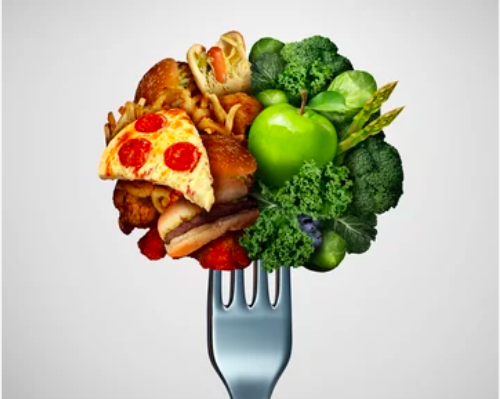|
But each is productive or counter/unproductive toward a goal or purpose.
This is an essential truth. Using terms like “good” and “bad” toward eating is self-defeating, because it begins with a moral framework which invites us to vilify or heroize ourselves through nutrition. That’s the wrong approach. We are neither food heroes nor food villains. Rather, we are in a state of productivity or counter/un-productivity. We are in a state of empowerment or disempowerment. We are not made evil nor righteous through foods. But we utilize them to move toward or away from certain outcomes. It’s not hair-splitting overture. A youth athlete who is very active and struggling to maintain or gain strength and size requires certain nutritional intake. She will need to be SUPER-sufficient (in excess) on a lot of different markers. That which is productive for her is almost precisely counterproductive for a rapid fat loss client. They may both need enough protein, fiber, vitamin and mineral intake. However, one must OVERdo on average; the other must UNDERdo on average. No food is inherently and always contextlessly good or bad for these two. Type, dosage, and timing of food matters, but in different ways for different goals in different people at different times. Yes. There are some more-or-less universally true “goodnesses” we might seek in nutrition: nutrient density; unprocessed; sustainability considerations. But even these are slippery slopes toward excessive moralizing. Is spinach good? What about for those allergic to it? What about canned? What about pesticide content? What about oxalic acid content? What about for people whose blood content of iron is already too high? What about when it has E. Coli? What if it causes the person GI irritation? What if the large farm which produces it uses more fossil fuel for their operation than your local beef farmer? What if the tiny plastic and tin cans for each 4 ounce serving of spinach produce millions of tons more waste material per pound of food than the 3lb pack of beef or the 400lbs bulk quarter cow purchased directly from a local farm? “Good” or “bad” is too high of a marker. It’s too much for the human brain. It’s too grand. It’s too contentious. And it is folly. It reinforces lies which are tempting: WE are GOOD people; THEY are BAD people. And it’s also precisely why it fails. Always. The insistence on RIGHT or WRONG with regard to food and lifestyle is so egregiously and blatantly wrong. It entirely misses the important question: is this PROductive? In repeated experiments, my blood chemistry worsens with plant-based eating. I wish I would’ve known this as a teen trying to understand my skin complexion. Now, it’s rather clear (no pun intended). Additionally, I’ve learned that my inflammatory markers worsen with a lot of plant food. My protective cholesterol drops. My non-protective rises. Conversely, when I emphasize animal-based nutrition, skin clears, energy improves, vitality benefits, and my lab values on blood draws optimize. Every. Single. Time. For 17 years. Notice what I don’t say. I don’t say primal or paleo is GOOD. I don’t say plant-based eating is BAD. Those types of proclamations are woefully inadequate. The individual tolerates or thrives on vastly different approaches. Again, one question rings out: is it productive? Is it? Is the food PROducing a desired outcome? Is it improving your prospects? A practical line of thinking like this will never be popular, because it doesn’t capitalize on provocation. It sidesteps the guilt-shame spiral. It lionizes no one. It belittles no one. It just simply keeps returning us to the same pragmatism: is this PROductive? People eating unproductively have a habit of telling us all how much “healthy and good food” they eat. Instead of focusing on the outcome, they’re intent on moralizing food, looking for a pat on the back or a moment of shame. This is entirely off the mark. Who cares about how “good” or “healthy” a food theoretically is, if it’s counterproductive in practical outcome? Steven Weinberg once quipped, "With or without religion, good people can behave well and bad people can do evil; but for good people to do evil - that takes religion." His note here would be well-taken applied to many things, especially nutrition. A food religion is what it takes for a “good eater” to have “bad outcomes.” A lot of people intently believe they’re eating GOOD food, despite no improvement in outcomes. That takes food religion, food dogma, food ideology, food politics. We could just leave the moralizing aside altogether and merely emphasize productivity. In that framework, there is no good or bad food. There is merely one question: is this PROducing the desired outcome?
0 Comments
Your comment will be posted after it is approved.
Leave a Reply. |
Elev8 Wellness
|
LIVE. AWESOME.We offer the highest quality in personal fitness, nutrition, and mindset coaching, helping you achieve your fitness, health, wellness and performance goals no matter the obstacle. With virtual online training and private, in-studio training we make it easier to reach your wellness goals safely.
No more can't. No more not good enough. If you compete in a sport, let your mind no longer hold you back from being the greatest. If you don't, let your mind no longer hold you back from being the best version of you that you can be. Sign-up for a Tour Covid Screen Waiver Elev8 Waiver Become an Elev8 Instructor Space Rental |
6244 lyndale ave. s., minneapolis, mn 55423
|
© 2021 Elev8 Wellness LLC. All Rights Reserved. site map | contribute | SITE BY Sproute Creative


 RSS Feed
RSS Feed
